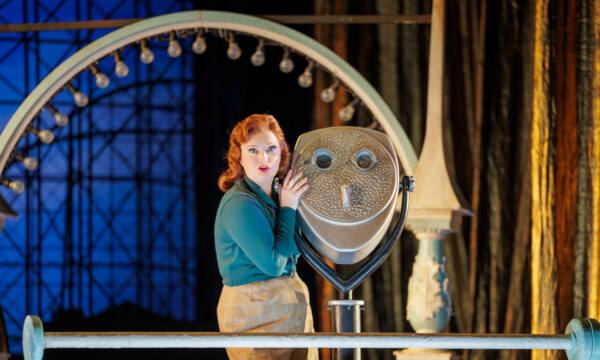Diary of a Madman at Omnibus

The low-ranking civil servant at the beginning of Diary of a Madman is a very different person to the cautious and hunched – yet somehow regal – man at its end. The one-hour stage show, directed by Scott Le Crass and adapted for the stage by Howard Coyler, portrays Poprishchin’s descent with legitimacy and humour, but with just a few missteps along the way.
portrays Poprishchin’s descent with legitimacy and humour, but with just a few missteps along the way.
Sticking closely to its literary roots, Gogol’s original short story took the form of a series of farcical diary entries; Poprishchin’s monologue holds on to the freedom of thought contained within the pages of his diary. Witnessing the formation of wild theories, which subsequently mutate into suspicion and eventually utter conviction, is a delight. Poprishchin’s redaction of his own beliefs in favour of wild conspiracy reflects the mind of a young child, perfectly willing to reform his own experiences.
Monologue might be too simple a description for Diary of a Madman, however, as actor David Bromley is joined on stage by disembodied voices. One of these voices is his own, although the performance is ambiguous as to what it represents. Whether it’s Poprishchin’s own train of thought or some sort of recording isn’t clear, but as the voice reads out each diary entry, the Poprishchin on stage riffs on the narration, repeating or predicting his own audio, taking different emphasis and even ignoring it all together.
It’s not the kind of adaptation you might expect. Rather than simply enacting the events in his diary, it feels like Poprishchin is recreating them within the confines of his grey, office-like room, all the while noting down and reciting the words to us and to himself.
Generally speaking, Coyler’s adaptation is successful, retaining Gogol’s wit and absurdity without getting too bogged down in his exact language, but larger changes undermine the play’s authenticity. Relocating the finale from Spain to England is an unnecessary change and mentioning nearby locales in south London for no discernable reason promotes parallels to a low budget village panto. Unexpectedly, though, the story’s visual representation is quick to pique interest. Mimicking the lead character’s journey into madness, both the set and Poprishchin’s wardrobe change inch by inch, then all at once.
Ultimately, a great deal of the play rests solely on Bromley’s unusual but effective performance. Despite an uneven use of multimedia, and some questionable decisions in the adaptation, Diary of a Madman gets to the heart of one of Gogol’s best short stories – talking dogs, noses, overcoats and all.
Joe Manners Lewis
Diary of a Madman is on at the Omnibus Theatre until 30th October 2014, for further information or to book visit here.

























Facebook
Twitter
Instagram
YouTube
RSS